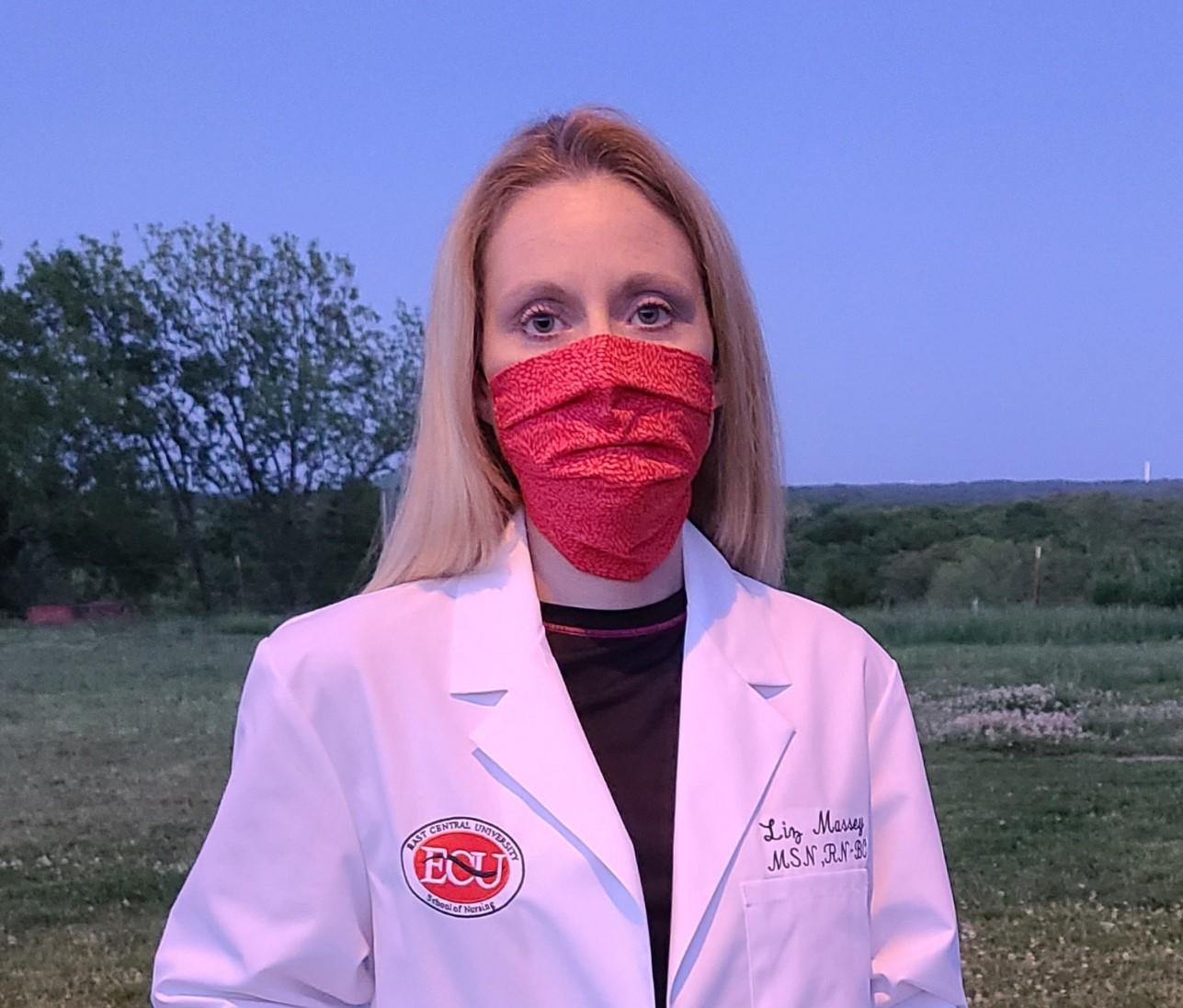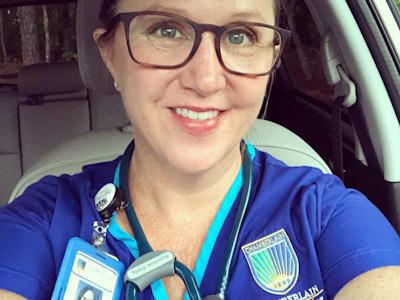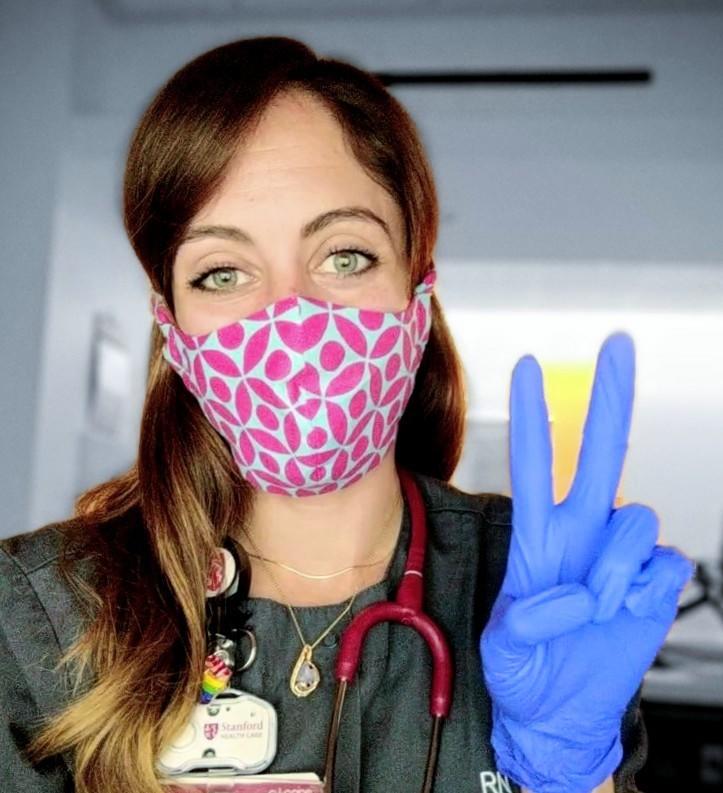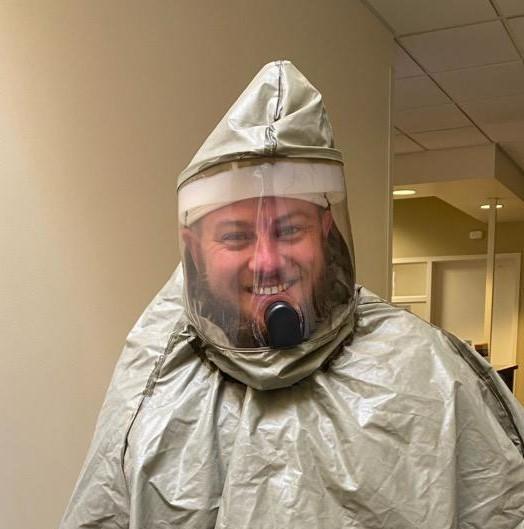Featured
Tags
Share
- Home / Blog / Nurses Week / Armed with a DNP, Liz Massey Hits the Ground Running to Provide Leadership Perspective During COVID
Armed with a DNP, Liz Massey Hits the Ground Running to Provide Leadership Perspective During COVID

An integrated leadership structure that concisely communicates updated, factual information while incorporating what’s happening on the front lines could help flatten the curve quickly and efficiently, according to Chamberlain University Doctor of Nursing Practice (DNP) alumna Liz Massey, DNP, MSN, NPD-BC, NEA-BC, NE-BC, RN. “There needs to be clear guidelines from our top medical experts and a complex structure that’s set up to better coordinate responses to what’s happening. If you’re on the outside looking in instead of in the thick of it, it’s easier to see the global view.”
Liz isn’t just taking note of how to improve the current situation; she’s ready to take action. The recent DNP grad, one of many nurses Chamberlain honors as a Portrait of Courage during this year's National Nurses Week celebration, said she’s had conversations with many chief nursing officers (CNOs). “They need desperately for leaders on the outside and in government to step up and say, ‘here’s what we’re doing to help control this and to support you with the resources you need to lead on the front line’.”
She said the rapidly changing COVID-19 environment has broadened her perspective of the healthcare field and the role of the DNP, allowing for more collaboration amongst educators, physicians and bedside nurses. “There are people out there working through their answers and I want to be part of disseminating that out to our medical professionals who are struggling to save lives right now.”
Utilize Lessons Learned
Liz plans to seek out research facilities in her home state of Oklahoma and perhaps neighboring areas to move the education needle forward—using what researchers and medical professionals already know about pandemics and what they’re learning in real time with COVID-19. Then she wants to combine her executive background and leadership skills to advance how a hospital system can best approach the current situation. “I know I have the knowledge and the skills that are necessary to put myself in the right pathway to help.”
Becoming a nurse seemed like the logical field for the lifelong problem-solver. Liz admired nurses for their ability to help others during extremely vulnerable times. Though she began in the medical field after a little nudge from dad, she quickly realized nursing was her dream. “Nurses not only share in their humanity of what they are experiencing, but they also collaborate with physicians and other medical professionals to help navigate patients through solving complex problems. Nursing is both an art and a science and becoming a nurse gave me an opportunity to help others while practicing science as well. I knew nurses made a huge impact on the lives of others.”
After earning her bachelor’s degree in nursing, her mission was to work in the largest trauma center in Oklahoma. But life took a redirect and Liz found herself in a small town with a critical access hospital—a disappointment from what she had envisioned… until she started working.
Do-It-All Nursing
“Sometimes when you’re the only RN or one of two in the building, your skills get pretty sharp pretty fast. It taught me how to be a nurse who must be everything to a patient. We didn’t have social workers or 24-hour labs. We had to figure out how to coordinate and organize their care much different than in other centers. Every step in my career, I have had things in my path that has taught me something different.”
Liz has not only learned various lessons but embraced and incorporated them into her arsenal of nursing knowledge that has ultimately advanced her career and expanded her perspective. After the critical-care hospital, she worked in the intensive care unit (ICU) of a small medical facility and was soon recruited for the obstetrics manager position, a high-end job she hesitated to accept with only one year of nursing under her belt. But her supervisor, like many that followed, saw an innovative leadership quality and wanted to capitalize on it. For the next seven years, Liz served as the nursing manager for obstetrics and pediatrics at that facility, which then led to a hospital educator role. “I had a love of education and figured I could really make an impact on patient care on a larger scale.”
Knowing another degree could propel her career, Liz enrolled in a master’s nursing program and was soon asked to step in as an interim director of nursing, a role she presumed would be short lived. But after six months, she was hooked and stayed on as the CNO for three years.
Then life took a turn and Liz found herself getting married and deciding to add to the family so she stepped back from the long hours and extended travel of CNO life. “That gave me the opportunity and the time to reflect on where my career should take me and how to use the skills and knowledge to build on the success I have and continue making a difference with patient care and nursing.”
Maximizing a DNP
That’s where Chamberlain’s DNP-degree program came in. “That was one of the best decisions I’ve ever made. It was exactly what I needed for so long but didn’t know I needed it. I am more excited than ever because you have so many options when you have a Chamberlain DNP.”
Though she may have choices, she must now find the time. First and foremost, Liz oversees school activities for her five children—a college-bound student now at home studying virtually, three children who require homeschooling (6, 10 and 17 years old) and a toddler with endless bouts of energy.
Juggling many tasks at once is not new to Liz. As a doctoral student, she taught classes for a traditional baccalaureate nursing program as well as online classes for a Registered Nurse (RN) to Bachelor of Science in Nursing (BSN) program. Additionally, she serves as president of the Oklahoma Board of Nursing, which is now planning the best ways to transition the process of licensing new nurses during this pandemic.
Assess, Re-Triage, Prioritize
“I have to organize and use my nursing assessment skills to figure out what I need to do now, do that well and then re-triage and re-prioritize to do what needs to get done next.” As for keeping her immediate family abreast of what’s happening in the world, Liz said the key is to relate the situation to someone they know and love or even admire. “I explain to my stepson that his father has asthma and we don’t want to do anything that puts him at a higher risk. It helps put it into a perspective that makes sense to them. You have to put a face to it so they can personalize it.”
She also assures them that there’s not a lot that can be done every day. “There is a lot going on that we don’t know and we can't control right now. We need to understand that there are a lot of things in life that we will regret. But education has never been one of them, and so continuing to work on their education and my education is only going to help ourselves as well as the larger community and society. As we get more knowledge and skills, we can help our society manage and cope with this COVID-19 situation.”
By Heather L Hurtado
More from Nurses Week
Request More Information
To receive the Chamberlain University Program Guide, including associated career paths, please select a program of study.







